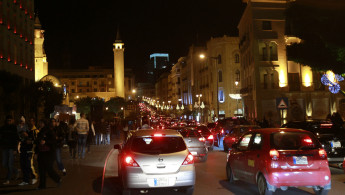Driven crazy: Lebanon targets road chaos with new law
Mohammad knows everything about Beirut's notorious roads. He braved the congestion, the potholes, the reckless behaviour and the abuse daily on his motorbike - that is until it was stolen. Now he walks, but that's hardly safer.
The Beiruti youngster might decide to get back in the saddle with the planned introduction of a law designed to bolster driving standards, target shady driving with fines and prison terms, and cut the country's road death figures, which have reached 700 a year.
Road users face penalties of $14 to $3,000 for 367 types of traffic violations in five categories. Dangerous drivers and those who drink under the influence could be jailed for between six months and four years.
Mohammad says the crackdown can't arrive soon enough. "Lebanon's roads are unsafe due to congestion, the poor condition of roads, the high number of traffic violations and the lack of traffic police," he says, adding that he has seen the police breaking traffic laws.
Lebanese drivers were excoriated in a 2010 study lead by the director general of Lebanon's public works and transport director, Elias Choueiri.
"Driving in Lebanon can be an adventure," the report said. "Motorists here are constantly the victim - and perpetrator - of careless, over-aggressive, and inattentive driving (the latter often linked to the constant use of the mobile phone). Other bloody-minded behavior includes driving against the flow of traffic, excessive use of the horn, and a fabulously cavalier approach to parking.
| Careless... over-aggressive... inattentive... bloody-minded. - description of Lebanese drivers |
"Drivers, pedestrians, and unorthodox vehicles have to compete for the same badly maintained roads... Obscene gestures and verbal abuse are commonplace. This, in turn, spawns... extreme acts of aggression, physical assault and - of course - accidents."
Perhaps as a result, the number of victims of traffic accidents has doubled in the past 10 years, despite Lebanon's commitment to the UN-sponsored Decade of Action for Road Safety 2011-2020, which aims to cut deaths by half.
The new law is the government's answer. It focuses on issues including organising roads, training drivers, holding driving tests, registering vehicles, checking vehicle roadworthiness, and prosecuting traffic violators.
New driving tests will be introduced that have both a theoretical and practical element, and are divided into categories depending on engine size.
Driving licences will now be subject to a demit system. Points will be added for violations and licences will be revoked for up to a year if 12 are imposed.
Those who have been driving for less than three years will be subject to tougher penalties and have a lower speed limit.
The law will create a new police enforcement unit and two traffic safety divisions headed by the prime minister and interior minister.
Stuck in first gear
The law has been stuck on red for a while, however. The Internal Security Force has put the brakes on once, arguing that the government has not set up the mechanisms needed for such a bold plan.
Joseph Msallem, a colonel in the ISF, said authorities were unable to implement the new law due to state paralysis - the post of president has been vacant since last May.
Most police officers are focusing on security issues due to instability in the country, he said - meaning traffic disputes and bumps can slip down the priority list.
The colonel said however that the ISF had installed speed radars that could produce 700 to 800 speeding tickets a day, and has created a traffic control centre.
| Authorities have not made the necessary efforts to implement the law Kamel Ibrahim, YASA |
Kamel Ibrahim, the secretary-general of YASA, an international road safety NGO based in Lebanon welcomed the law byt expressed concerns about its implementation.
"Authorities have not made the necessary efforts to implement the law by, for example, finalising the procedure for collecting fines from motorists," Ibrahim said.
He said citizens were asking legitimate questions about how the law will be enforced in a country with many illegally tinted cars and vehicles without licence plates.
He said any fines collected should be spent on improving the roads - Lebanon's current law pays them into retirement and insurance funds for judges and ISF officers.
There was no plan to upgrade infrastructure, educate citizens, and enforce the law appropriately, he said.
For citizens like Mohammad, however, anything that attempts to tackle the carnage would be welcomed.
This article is an edited translation from our Arabic edition.



